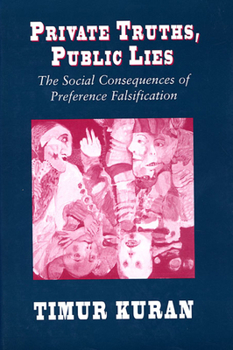Private Truths, Public Lies: The Social Consequences of Preference Falsification
Select Format
Select Condition 
Book Overview
Preference falsification, according to the economist Timur Kuran, is the act of misrepresenting one's wants under perceived social pressures. It happens frequently in everyday life, such as when we tell the host of a dinner party that we are enjoying the food when we actually find it bland. In Private Truths, Public Lies Kuran argues convincingly that the phenomenon not only is ubiquitous but has huge social and political consequences. Drawing...
Format:Paperback
Language:English
ISBN:0674707583
ISBN13:9780674707580
Release Date:September 1997
Publisher:Harvard University Press
Length:448 Pages
Weight:1.45 lbs.
Dimensions:1.1" x 6.1" x 9.2"
Customer Reviews
3 ratings
Clear thinking about issues that many avoid thinking about
Published by Thriftbooks.com User , 20 years ago
This book does a good job of analyzing the causes and effects of the differences between public and private beliefs, although it is a bit slow and long-winded. Much of what the book says seems like it ought to be obvious, but for the most part I hadn't thought very clearly about these issues, and at very least the book persuaded me to clarify my thoughts. He makes a strong argument that some aspects of revolutions are inherently unpredictable, but I'm still trying to decide whether he succeeds in refuting alternative theories that imply factors such as sudden declines in wealth can help predict revolutions.
Fascinating Book
Published by Thriftbooks.com User , 21 years ago
This is a fascinating, thought-provoking book that discusses with great skill issues like preference falsification, pluralistic ignore, social psychology, and related topics. It's a great study of why people too often don't do what they believe. The book is very easy to read and strikes a good balance between being based in research and telling a good story.
Why people lie in groups. Strikingly original theory.
Published by Thriftbooks.com User , 27 years ago
Economists, sociologists and psychologists each base their models on underlying conceptions of man: Homo economicus is the bloodless and instantaneous calculator of costs and benefits; homo sociologicus is a product of social stimuli; and homo psychologicus is ruled by conscience. Kuran has done something quite novel in this non-fiction book- he has melded all three theories into one, and uses it to explain why people often times mask their true opinions in groups. This is remarkable feat given the relative lack of cross-pollination across these three disciplines. The theory is intuitively easy to grab, yet one yearns for examples which directly connect to his theory. I spent a long time trying to understand what was meant by "intrinsic utility" since it was defined in different ways in different parts of the book. The chapters are meant to buttress his theory by tackling such issues as revolution, affirmative action, and slavery, but they are not especially well integrated into the first part of the book. In fact, they read more like stand alone articles. The book is original and thought provoking. There is no other book like it. Those who are not trained in economics will find plenty to talk and mull over in the later chapters. But Kuran could do a better job of explaining the early section with more illustrations. Hopefully, he will address these concerns in a later edition.






